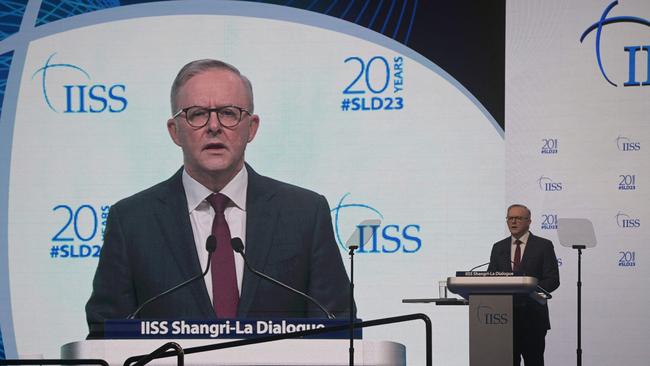
The Prime Minister made no barbed accusations and described Australia as seeking to be a force for dialogue and for neighbourhood stability, but he stated plainly that we stood by our long alliance with the US and were acquiring nuclear-powered submarines as part of a commitment to deterrence and reassurance within the Indo-Pacific. Those words were clearly directed at Beijing.
When he spoke of the danger of any power taking unilateral action to alter the status quo by force, it was manifest that he was talking of China, though he made passing reference to North Korea. He underlined this by adding: “whether in the Taiwan Strait, the East China Sea, the South China Sea or elsewhere”. The elsewhere might have meant the Korean Peninsula, but it just as easily could have meant the contested borderlands with India.
As if to impress on his actual and primary audiences where Australia stood on all these matters, he added that “American leadership” had been “indispensable” to building and maintaining the peace, stability and free trade that had been the preconditions for Asia becoming, since World War II, and China since the death of Mao Zedong, such a fast growing and prospering part of the world – indeed, “the engine of the global economy”.
There is, of course, a body of opinion, here and in China, that openly holds that China is the rising and “natural” hegemon in Asia, that the US is in relative and even absolute decline, that it should yield East Asia to China, withdrawing gracefully rather than risk a war that it would likely lose, and that Australia has erred in joining AUKUS and contracting to purchase nuclear-powered submarines from its Anglo-American allies.
Albanese was holding the line on the clear foreign and security policy that his government has followed from day one, a year ago.
Though his address only hinted at this, the principles he spelled out concerning dialogue and collective security, guardrails and rules of the road are what the Chinese Communist Party is putting at risk and, in fact, openly challenging. The subtext, therefore, of the Prime Minister’s address was an appeal to Beijing to accept that it should not use force to unilaterally alter the status quo, that it should abide by agreed rules of liberal world order and that it should not use economic coercion in an attempt to subordinate smaller states to itself – as it has been doing.
Now, if we suppose that Xi and his politburo and central military commission understand that they have been pushing the envelope and, on reflection, concur with the Prime Minister’s desiderata and his observations about world order, all this would be reassuring. And they might well have so reflected, if what they wanted was a peaceful evolution of the existing world order, adjusted for its growing wealth.
Alas, that is not how things are viewed in Beijing. For more than 30 years the grand strategy of the National Leninists who rule China has been to displace the US and become the dominant power first in Asia and then globally. This is coming to head under Xi, as he has made explicit. Therein lies our problem. Understand that as the problem, and Albanese’s observations and hopes become more problematic.
The grand strategy we are facing is pinned to the retention and propagation of autocratic politics, which is why the term National Leninists is appropriate. Beijing’s goal is to detach us from our alliances, to displace the US in Asia and to subject Taiwan to its dominion, as it has Hong Kong. All this was underscored when, later in the day at the Shangri-la, Chinese Defence Minister Li Shangfu bluntly told those present that, when it came to China’s territorial and maritime claims, others should “mind their own business”.
There’s the rub. While Albanese talks of dialogue and describes the putative role of our future submarine capability, there is a real and present danger that Beijing will keep pushing to overturn the existing order.
There are indications that the balance of this decade will be critical in military terms – and we are insufficiently prepared for what would happen if push comes to shove. It could do so within the next five years. Xi is deadly serious and does not live in Shangri-la.
Paul Monk is former head of the China desk in the Defence Intelligence Organisation and a fellow of the Institute for Law and Strategy (London and New York). A new and updated edition of his 2005 book Thunder from the Silent Zone: Rethinking China has just been published.




Anthony Albanese acquitted himself with great dignity at the recent Shangri-la Dialogue in Singapore. He spoke fluently and without notes and rather eloquently articulated the case for a liberal rules-based international order and the need for collective security. He was clear and statesmanlike in his observations about what made for peace, stability and prosperity, and what could disrupt them. His problem and ours is that Xi Jinping does not see things that way.